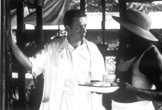






| Le Grand Blanc de Lambarene
Like Frantz Fanon: Black Skin, White Mask and Rouch in Reverse, this film begins to rewrite the history of colonialism from the point of view of the colonized. Le Grand Blanc de Lambaréné is not, however, a facile exercise in iconoclasm but rather a deeply-felt lament for a missed opportunity, for a cross-cultural encounter between Africa and Europe which never happened. Shot on the site of Schweitzer's hospital in Gabon, Bassek ba Kobhio elicits psychologically complex portrayals from his actors as he did in his earlier California Newsreel release, Sango Malo. Behind Schweitzer's impenetrable reserve, Ba Kobhio discovers a man blinded to the people around him by his own spiritual self-absorption and arrogance. For Schweitzer to see himself as a stern but loving father, he had to cast Africans as childlike primitives whom he could protect from the temptations of modernity. He even refused to install electrical generators or institute modern sanitation in his hospital's wards. In the film, an African boy Schweitzer discouraged from becoming a doctor, returns with his degree and rebukes him: "The independence of the people has never been your concern. You only wanted to share their hell in the hope of reaching your heaven." The film reveals
that the ultimate tragedy of colonialism may have been its refusal to
see and value the colonized as autonomous, creative human beings. Schweitzer
knew numerous European languages but never learned to speak the local
tongue; he was an accomplished organist and Bach scholar who never evinced
any interest in African music. Ba Kobhio represents the richness of
Africa through Bissa, a beautiful concubine the local chief gives le
Grand Blanc. Though clearly tempted, Schweitzer remains aloof; only
at his death does he invite her to sleep in his bed rather than on a
mat. The film's epigraph, ironically, is a famous remark by Schweitzer
himself: "All we can do is allow others to discover us, as we discover
them." |
"Gripping, vast,
animated, with something profoundly magical...In Le Grand Blanc
the cinema truly meets Africa." "Audacious...The
filmmaker presents the story of Schweitzer from an incisive, intellectually
provocative point of view." "Challenging...Period
detail is painstakingly recreated to present an utterly unromantic view
of colonial Africa." "Though the
subject is in the past, the filmmaker succeeds in describing today's
Africa of humanitarian NGOs and voluntary doctors of which Schweitzer
was, unwittlingly, the forerunner." Director: Bassek
ba Kobhio
Video Purchase: $195
|
 Cameroonian
filmmaker Bassek ba Kobhio provides a fascinating revisionist perspective
on Albert Schweitzer, Noble Peace Prize winner and secular saint of
the colonial era.
Cameroonian
filmmaker Bassek ba Kobhio provides a fascinating revisionist perspective
on Albert Schweitzer, Noble Peace Prize winner and secular saint of
the colonial era.